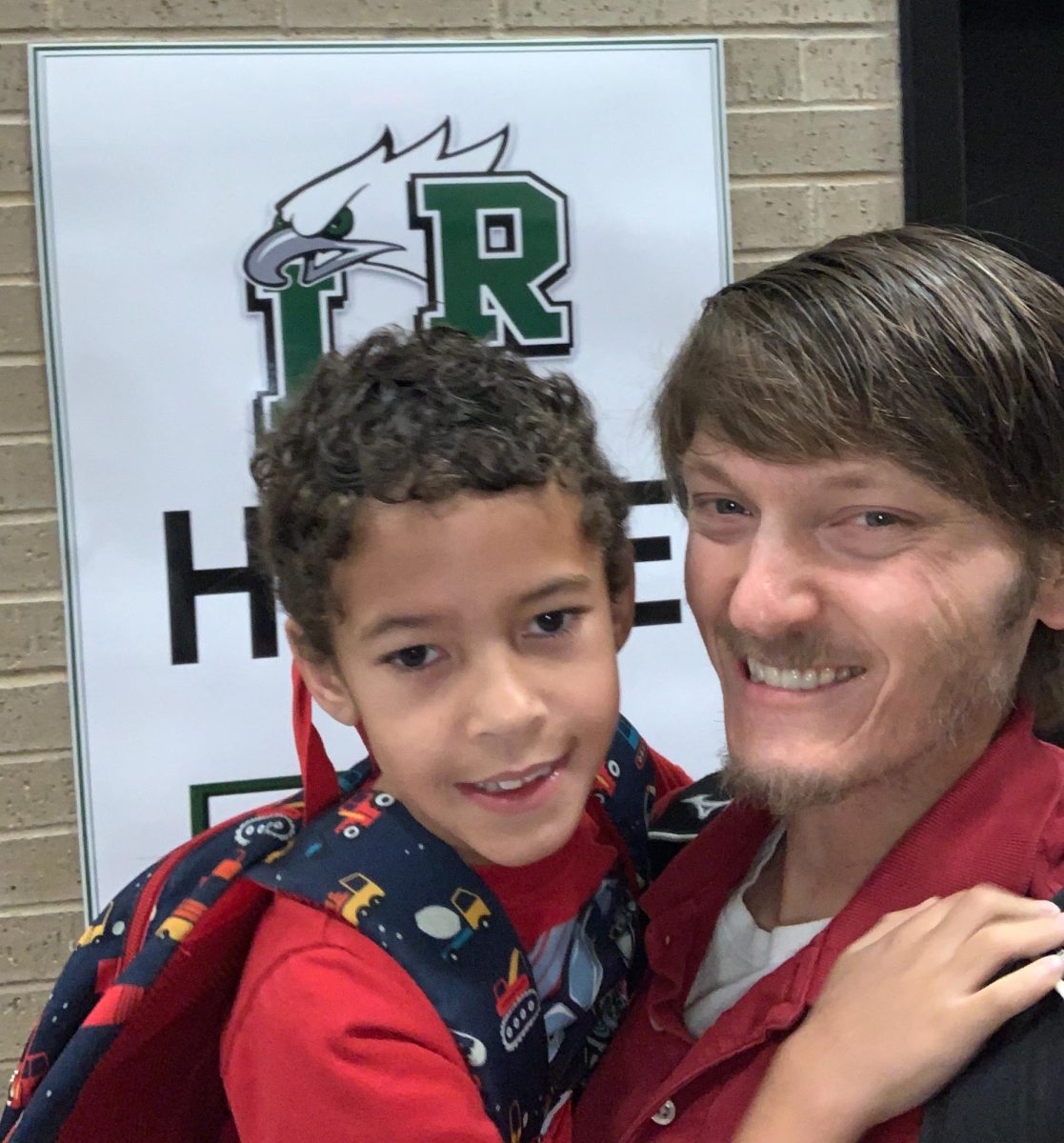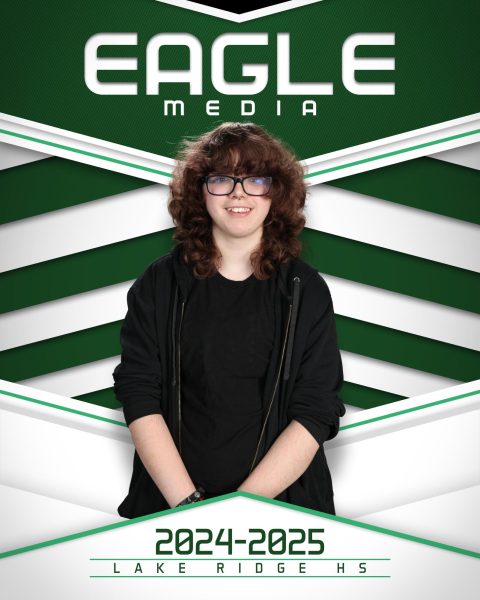Christopher Reynolds, a world history teacher, wants to teach students a new way to see the world through history. He does all of this, and more, while fighting cancer, which has affected his life and style of teaching.
When teaching any class, it’s important to have passion for the class’s subject. Reynolds loves history, and a lot of that love is attributed to his family.
“My paternal grandfather would talk for hours and hours about history, and he would read me books about history. My dad is also a history buff, and with my dad, we would go visit museums and Civil War battle sites, and it was very intriguing,” Reynolds said.
Though teachers need to have more than an interest in the subject they teach, they also need to be dedicated to teaching. Even with his love for history, Reynolds did not plan on being a teacher.
“It took me 7 years to get my undergraduate, the first 5 years I just did history. I thought I would work at a museum or for the FBI, and then I had a mentor who was like, ‘Hey, you would make a good teacher. You’re very patient and you help people understand information.’ So, after many conversations, I switched from history to education,” Reynolds said.
Going through college is an important part of any teacher’s career, with the profession requiring multiple certificates and degrees. For Reynolds, college was full of hardships and challenges he had to overcome in order to graduate.
“When you go to college, some people are very lucky. They go through it, there’s no emergencies, there’s no disease, there’s no family situation. And other people, like myself, had to go through family tragedies, and on top of that, I got diagnosed with cancer,” Reynolds said. “So [my time in college] went from 4 years to 7 because a lot happened. The hardest thing is working through those situations and maintaining your focus.”
In college, cancer was Reynolds’ biggest challenge as he went through surgery and radiation, all the while keeping up with his academics.
“It was very challenging. I got cancer my 6th year and it was bad, but I still had surgery and I finished that semester. I had stitches and staples everywhere. I felt horrible. So, I finished that semester having had surgery, and that summer I had radiation. I lost like 60 pounds because I couldn’t eat food, and so, that fall, I had to do student teaching. I was tired,” Reynolds said.
Beyond being necessary to teach, seeking a higher education is a great way to make new memories and experience personal growth. Reynolds had a very unique university experience which expanded his world view.
“In 7 years, I went to 3 universities and 1 community college, and my experience with those was understanding people. The first 2 of those universities were HBCUs, and looking back, I should have enjoyed it more, but I played baseball and was focused on other things. But, being at 2 HBCUs opened my eyes up to a whole new culture that I was not accustomed to,” Reynolds said. “Me being the only white baseball player on my baseball team really helped me develop a lot of understanding and empathy. Then, same thing, second college I was one of 3 white people, and so on the buses we would have many discussions, me being white, them being black, and we would just have many different conversations. It opened my eyes to a completely different culture. The university I graduated from was predominantly white, and so just seeing an HBCU and a non-HBCU was a fantastic experience.”
Along with expanding a student’s worldview, these institutes also help people become a more in-depth person. Reynolds believes college is where you transition from a teenager into a full adult.
“College is potentially one of the most challenging aspects of life, but it is so transforming. There is a stigma nowadays that college is too expensive. Yes, it is extremely expensive, but college is not about trying to make money at the end. There’s a misconception that you go to college to make money. That’s true, but you also go to college to transform you as a human from a teenager into an adult. When you’re at college, it’s about experiences,” Reynolds said. “You meet people from all over, and as you get to know them, you become friends with them, you taste their food, you listen to their stories. It helps you develop into a much more in-depth person, so think of college as a transformative time period, not just about money.”
Choosing what district to teach in is an important decision as different districts have their own rules and quirks. Reynolds had a long journey to end up teaching in MISD.
“I graduated from Arkansa, went to Fort Worth, and then went from Fort Worth to Evelyn, and from Evelyn to MISD. Mrs. Alloway gave me an opportunity, I don’t know what she said, but she gave me an opportunity [to work here,] and plus, I live like 10 minutes away, so I live in the community,” Reynolds said.
Teaching any subject has its positives, and Reynolds’ favorite thing about teaching history is helping students learn about their history and lineage.
“It’s a great way to tell a story. You can take any student and you can help them understand who they are through the spirit of history, because, in history, everything is connected,” Reynolds said. “Many people ask certain questions when they’re older, ‘Why am I here,’ ‘Who are my parents,’ ‘Who are my grandparents,’ and then you are able to make those connections.”
While Reynolds enjoys teaching history, it can also be challenging. Reynolds believes the hardest part about teaching history is trying to get students to respect it as a subject.
“There’s a misconception that history is about just memorizing facts, but history is more about storytelling and the skill of critical thinking, and so the most challenging part is trying to get students to be on the same level of that with the importance and understanding of history, and then I teach it,” Reynolds said. “To me, it is the most important subject that gets the least amount of respect because people think, ‘Oh, coaches teach it, it’s not important.’ People think it’s easy, but what a student does in history is the most challenging because history is about trying to understand things.”
Every school subject is important to learn for their own reasons. Reynolds believes that learning history is important because it’s necessary to understand current events.
“You need to be able to say, ‘Hey this has happened and this has happened, so what were the challenges of it and how did people overcome it,’ and then apply that to current events. And then through history, as an individual, you can study history and apply it to individuality,” Reynolds said.
Cancer affects its victims’ lives every day, and Reynolds is no exception. Reynolds has had to take an entirely new approach to teaching to work around his disability.
“I have to go much slower. I have to write things down, I have to ask my students, ‘Do you understand,’ I have to, at the beginning of the school year, I ask my students some questions so they can try and understand my voice. So, I have to almost train my students to be open to listening to what I’m saying,” Reynolds said. “For example, when I talk, I have my students put their phone down, put their computer down, because if they’re not looking at me and they’re not fully engaged with me and what I’m saying, they’re not going to understand it. They cannot look away and understand me. It’s a completely different approach. What also helps is technology with Canvas. I can use that as a way to show the lessons.”
Even with the challenges that come with teaching with cancer, Reynolds has found a silver lining to it.
“I think when I go slower, students understand more, and with cancer, I have to be patient with myself and especially patient with my students. I’ve never not had cancer as a teacher, but before I had cancer, the way I coached and taught at college was very fast paced, but now it’s like, ‘You gotta sit down, relax, and then teach,’” Reynolds said.
Another positive of teaching is all the memories and connections people can make. Reynolds’ favorite moment as a history teacher was connecting with a student who was similar to him.
“I think my favorite moment was connecting with a student that sounds like me. I had a student last year who said, ‘Hey, you sound like me,’ and then he asked me a lot of questions like ‘How do you handle it,’ ‘What do you do when you have people who are mean to you,’ ‘What do you do when you have people who do not understand you,’” Reynolds said.
Despite the challenges presented from his cancer, Reynolds continues to teach world history. He hopes to connect kids to themselves through the stories of history and help them realize the importance of history in everyday life.


